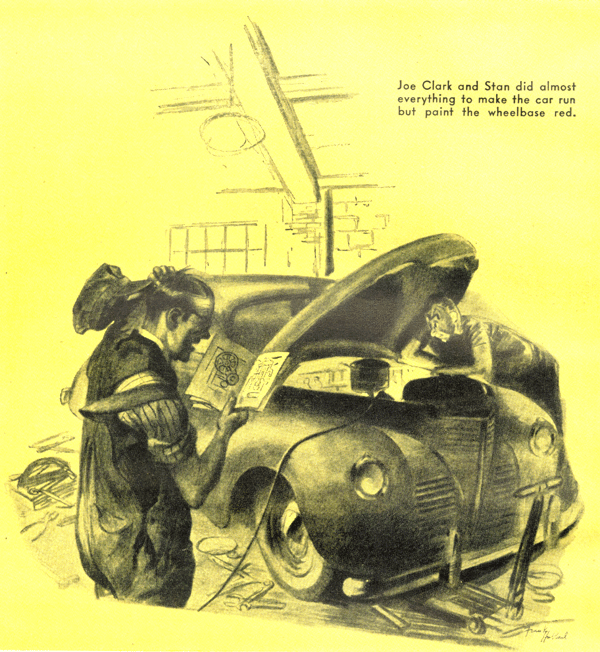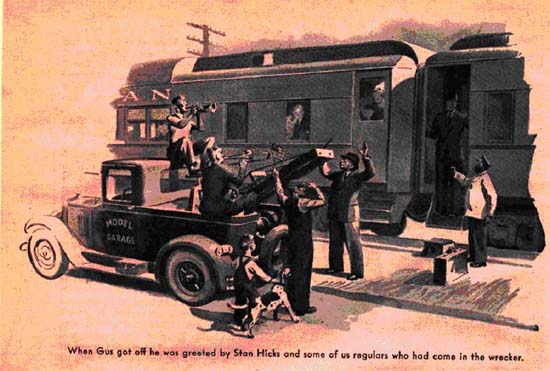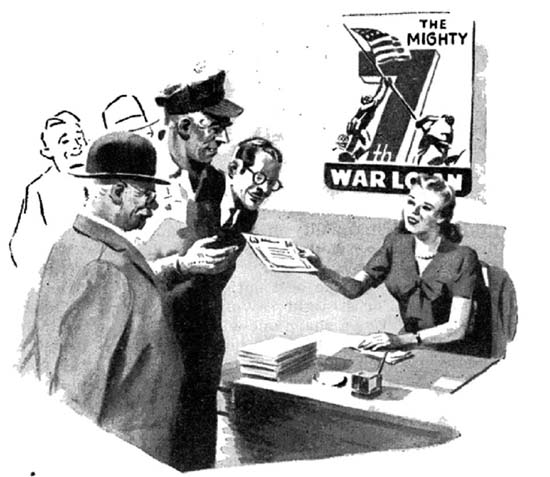August 1945
GUS GETS THE LOW-DOWN
ON THE NEW CARS
by Martin Bunn
Improvements Are Coming, He finds,
But the Old Bus May Still Have To Do A While.

When the WPB gave the green light for production of 200,000 cars this year, the Model Garage regulars could hardly wait for the first rainy Saturday afternoon. Arguments over what the new cars would be like were going hot and heavy -- bucked by offers of cash bets --when Gus Wilson rapped for order with a peening hammer.
"Pull over, you fellows, and let your engines cool," he laughed. "Do you realize you're just telling each other what you want in your new car -- not what you expect?
George Knowles here wants a big powerful car for vacation trips. Ez Zacharias is thinking of a model that can take it on back-road RFD routes. Doc Marvin wants mileage on city streets. Tim Sheridan -- "
But we were too sure of ourselves to let Gus finish, and just then his partner, Joe Clark, walked in from the office.
"Why don't you make a sweepstakes of it," he asked. "Everybody put up $10, and the winner take all. Gus is going to Detroit anyway. He can find out what's what."
"I'm going," Gus agreed. "But it's to find out what chance some of our customers have of getting new cars before they get expensive repair jobs on their old buses."
He went that night, and early the next morning he got off the train with a mild upper berth grouch that was dissipated by a cup of coffee at the station lunch counter. While he was drinking it an important looking individual sat down next to him snapped his order at the waitress, looked Gus over, and asked: "Automobile man?"
"Well, sort of, Gus admitted modestly.
Thought so -- can always tell 'em. What do you think of that new job Oldsmobile is going to put into production when they clear out the aircraft work at Lansing?"
"I haven't heard about it," Gus told him. His new friend had a self-satisfied grin.
"Not many have," he said. "This town is full of gossip about the new cars, but only we on the inside get the real low-down."
He looked around suspiciously, leaned toward Gus, and lowered his voice. "This new Oldsmobile has real joy-stick control-just like an airplane-that ties in with its hydra-matic transmission. If you pull back the steering wheel, the brakes go on. And when you push forward, the throttle opens and you get more speed. Neat, hey and I'll tell you something else -- the Olds will be the first General Motors car that you'll see in the salesrooms."
Gus watched him go out, and then, after a second cup of coffee, phoned an old friend who is something in General Motors.
Who? Asked the voice of the other end of the wire. "Gus Wilson? Of course I want to see you! Come now, if you can."
Ushered into an impressive office, Gus was treated like visiting royalty. "Looks as if Detroit has been good to you," he commented.
"It has," his friend admitted. "But what are you doing here, Gus? Looking for a job, I hope. We could use -- "
"Thanks," Gus said, "but I've got a business of my own to look after. It isn't as big as this one, but it suits me fine. What I came to Detroit for was to find out about the new cars." Then he told what he wanted to know and why he wanted to know it.
His friend grinned. "You sure do give your customers service!" he said. "Well, you know what the situation is. Re-conversion is a tough job, and some materials -- especially rubber, textiles, and wood are hard to get, but we'll make out. This year's cars, and probably most of next year's, will be rationed. Those customers of yours whose buses need repairs had better have them done."
Gus nodded. "That's the way it looks to me," he agreed. "But how about new designs and engineering features?"
"Well," the reply was cautious, this automobile business is highly competitive, and manufacturers generally don't do much talking about new features until a care's in production -- there's always a chance that some competitor might like the idea and redesign his sales campaign even if he didn't have time to re-design his car.
"I hear a lot of things, of course, but it's hard to separate truth from hooey. It's a fact, of course, that Willys-Overland is going to build jeeps for farm cars -- pretty much the same as the Army jeep, only the transmission gears and the transfer case are strengthened, and there is a power take-off. Then someone was telling me that Graham-Paige is designing an entirely new car with a 100-hp, six-cylinder engine in the rear. And Ford -- you ought to see the Ford people."
I'm going to," Gus assured him. "But you haven't told me anything about your G.M. cars -- that $500 Chevrolet I've been hearing rumors about for example."
The man became even more cautious. "We're doing more war work then any other company, so we're facing bigger re-conversion problems," he said.
"I doubt if we will bring out a brand-new postwar car before 1947. We expect to be able to produce our quota of 95,000 cars this year. They'll be modified '42 models, but they'll have plenty of improvements -- nearly every part has been improved since the beginning of the war, and we are going to pass a lot of improvements along to the car buyers. We're going to keep the price of the '45 Chevrolet as low as possible, but it'll be over $500. The new light model is for later on. If you're looking for something sensational, Gus -- "
"I'm not," Gus cut in. "But I've heard about something sensational. How about that Oldsmobile with joy-stick control?"
"Joy-stick control, hey?" his friend asked. "First I've heard of it, but it could work." His telephone buzzed, and he answered it. "Sorry, Gus. I've got to go to a conference. If you're in town tomorrow, give me a ring and we'll have lunch together."
Gus has another old friend who occupies one of the seats of the near-mighty in the Ford organization. He was cordial and enthusiastic when he saw Gus. "Will I tell you about our new car?" he repeated. "I'll do better than that -- I'll show it to you!" He led the way into a large room. A shiny car stood in the middle of the floor. "There she is -- all handmade, but just like the Fords we're putting into production."
Gus ran his experienced eyes over the car. "What's under the hood-one of those new five-cylinder engines?" he asked.
"Not on this model," he was told. "But they might use one in the lightweight, lower-priced car that may be coming along soon. They've been experimenting with three different engines, one of them a five-cylinder in-line and one a five-cylinder radial.
"But this baby has plenty of mechanical improvements that will give the buyer greater economy in operation and increased riding comfort. It's a good car."
Gus dropped into see a couple of other old acquaintances, and from them gathered that new Packards will be on the road by October, that new Chrysler models were still in the clay state in the designing rooms, and that the Dodge engineers were concentrating on a new six-passenger closed model.
By then his stomach was insisting that it was time to eat. He went into a crowded restaurant and was shown to a table where two men were talking earnestly. "Textiles are the worst bottleneck," one of them was saying. "Upholstery and backings depend on textiles, which aren't to be had. So how are they going to turn out cars?"
"That's not bothering Ford," his companion came back. "He's going to use his own spun-glass products for upholstery and floor coverings, according to the grapevines."
Gus decided to call on another old friend -- now a hot-shot publicity man. As Gus had expected, he admitted he was very much in the know.
"Watch Marshall Field," he told Gus portentously. "I hear he's going to take up along the same lines that Henry Kaiser did -- that he's made big offers to several top engineers and production men to go to Chicago and help create a sensational new automobile. And watch Hudson. It's been denied, but there's more than most people think in that story that the Fisher brothers want to take over Hudson."
"That's exciting," Gus said, "but it's out of my line. I'm not so much interested in who makes cars as I am in the low-down on what models they're going to make this year."
This elicited a frown. "New models-that's something I can't talk about, even to you. I know a lot about them -- but you realize that the confidential relationship between a professional man and his clients must be respected. But let's see. I could arrange -- "
He spent a few minutes at the phone. "I've fixed it for you to see the most revolutionary automobile ever designed," he told Gus.
It was quite a long ride. They stopped at a sign-less side gate of a small factory. Inside they were greeted by two men who carried rolls of blueprints, and they were escorted to a courtyard in which stood an automobile covered by a big tarpaulin.
"There she is," one said.
Gus looked at the shrouded car and then at their escorts.
"That's all you're going to see, mister," one of them snapped. "That cover doesn't come off until the car is in production. I'm not going to have my ideas stolen!"
"I'm sorry," Gus's friend said when they were back in his car. "But you know how inventors are. Can I drop you anywhere?"
"Yes," Gus said, "you can drop me at the railroad station. I'm going home!"
When Gus got off the train the next morning, he was greeted by the strains of "My Merry Oldsmobile" rendered by some of us regulars who'd come with Stan Hicks in the wrecker to meet him. All Gus did was smile rather wanly at our orchestral effort. He wouldn't talk until we got back to the Model Garage, where half a dozen other sweepstake builders were waiting.
Gus grinned sheepishly, "I suppose you want to hear my report," he said. "All right. From what I heard, none of you has a chance to buy a new car for a long time, so you'd better keep your old buses running for another year -- maybe two years."
"But who wins the sweepstakes?" we asked
"Nobody -- not now," Gus told us.
There was a howl and a babel of demands to know what Gus meant.
"But their money," Joe put in when he could make himself heard. "You have to decide whose idea is nearest what the new cars will be, Gus, so the sweeps can be paid."
"Let's hold the money," Gus smiled. "I'll decide when all the '46 cars are in the salesrooms!"
"That's fair," Ez Zacharias acknowledged. "But it'll keep our money tied up."
"No it won't," said Gus. "I've got a sore cure for that. And it ties right in with my breakfast, which I haven't had yet. Come along."
Puzzled we followed him to the Park House, straight to the War Bond booth in the lobby.
"And that," he grinned, waving the bond he'd bought, "is what all of us had better do until the new cars really get rolling."
Nobody argued with him.
END
L. Osbone 2019

